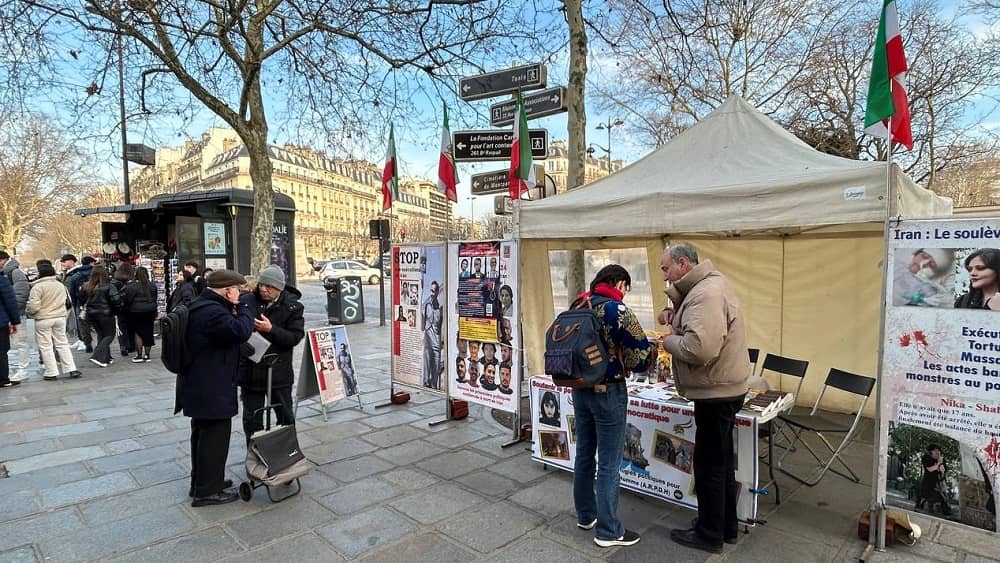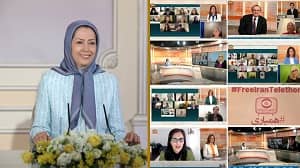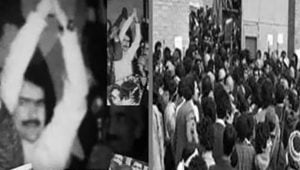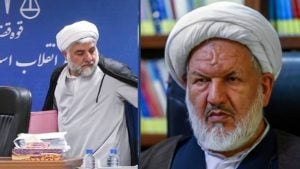Facebook
Twitter
LinkedIn
Pinterest
Reddit
Email
Print
 Supporters of the Iranian Resistance in Paris, France, held a bookstand on January 21, 2025
Supporters of the Iranian Resistance in Paris, France, held a bookstand on January 21, 2025
THIS PAGE WILL BE UPDATED WITH THE LATEST NEWS
UPDATE: 7:00 AM CET
Maryam Rajavi’s Message on the Successful Completion of the 29th National Hamyari (Free Iran Telethon) with Simay Azadi (Iran NTV)

Maryam Rajavi’s message: “A heartfelt congratulations to all compatriots and supporters of Simay Azadi, who, with passion, awareness, and selflessness, and through their defiance against the inhuman regime, transformed the 29th National Telethon into a march of solidarity with the Resistance and a campaign for freedom.
“I salute all the hands, voices, and hearts brimming with faith and sacrifice, who rose with admirable enthusiasm to keep the flames of hope and resistance burning brightly.
As Massoud Rajavi, the Leader of the Iranian Resistance, has said, anyone who contributes, whether through their time, wealth, words, or steps, in the path of freedom is a supporter and ally of the Iranian people’s Resistance.”
January 20: A Milestone in The Struggle for Freedom in Iran

Every revolution, from its inception and formation to its culmination and victory, passes through milestones and turning points that play a decisive role in shaping the roadmap and nature of the revolution. January 20, 1979, and the release of Massoud Rajavi along with the last group of political prisoners from the Shah’s prisons in Iran, was undoubtedly a decisive turning point in the path of Iran’s democratic revolution and the struggle for freedom.
The treacherous Shah, after the fall of the monarchical dictatorship, lamented the release of political prisoners and mentioned in his book that his greatest mistake was freeing them from prison.
The mullahs’ regime also saw the vanguards of the anti-monarchical revolution as the main obstacle to establishing its dominance. In his actions, fatwas, and vengeful claims against Massoud Rajavi and the PMOI, regime founder Ruhollah Khomeini clearly demonstrated that they were the primary threat to his absolute rule.
The Ocean of Anger: How Targeted Assassinations Reflect Iran’s Social Unrest

Recent developments in Iran have captured attention, as the killings of two infamous judiciary figures—Ali Razini and Mohammad Moghiseh—are being widely discussed by regime officials and critics alike. These events, described as acts of terror by the regime’s officials, have raised questions about their implications for the regime’s stability and the deep-seated grievances within Iranian society.
Mohsen Mahdian, the manager of Hamshahri newspaper, described the assassinations as a sign of “terror in Iran reaching maturity,” targeting what he called “the hard core of the system.” According to Mahdian, the removal of influential figures like Razini and Moghiseh sends “a clear message” to those aligned with the regime, particularly those living under “passive fear.” He attributed the killings to foreign enemies aiming to instill a sense of powerlessness among the populace and to “socialize terror.”
Iran Faces a Harsh Summer Ahead

Water scarcity has become one of Iran’s main crises. Due to declining rainfall in recent years and mismanagement of water resources, it is predicted that the upcoming summer will pose even more serious challenges in this regard.
Climate change, overexploitation of groundwater resources, and the lack of sustainable planning are among the key factors exacerbating this crisis.
Water consumption naturally increases in the summer. This, combined with declining reservoir levels and the erosion of groundwater tables, puts additional pressure on the limited water resources.
Deprivation of Basic Rights for Female Political Prisoners in Evin Prison

In the latest wave of restrictions against female political prisoners in Evin Prison, nine detainees, including Varisheh Moradi and Pakshan Azizi, have once again been denied visitation with their families and lawyers. Some of these prisoners are facing harsh sentences, including the death penalty, and have repeatedly been stripped of their human rights due to their peaceful protests. According to informed sources, as of January 12, 2025, in-person family visits for these prisoners have been canceled. Additionally, two other prisoners, Maryam Yahyavi and Sakineh Parvaneh, have been denied the right to make phone calls to their families.
The list of prisoners deprived of visitation includes Anisha (Maryam) Asadollahi – Golrokh Iraee – Vida (Vaheedeh) Rabani – Zahra Safaei – Pakshan Azizi – Elaheh Fouladi – Motahareh Gonaei – Varisheh Moradi – Maryam Yahyavi
Simay-e Azadi’s 29th Free Iran Telethon: Four Days of Global Solidarity and Support for a Free Iran
The immense support from freedom-loving Iranians worldwide led to an unprecedented response to Simay-e Azadi’s 29th telethon. Originally scheduled from January 17 to 19, 2025, the telethon received an outpouring of contributions and messages, demonstrating the global commitment to a free and democratic Iran. This overwhelming enthusiasm led to the extension of the event, with January 20 as a fourth day, allowing even more supporters to contribute to the cause.
Southampton Hosts Exhibition to Protest Iran’s Death Sentences and Support Political Prisoners
Southampton, UK – January 18, 2025: Members of the Academics in Exile Association, supporting the People’s Mojahedin Organization of Iran (PMOI/MEK), organized a book and photo exhibition to protest the death sentences imposed on political prisoners associated with the PMOI.
Berlin: Gathering to Celebrate Massoud Rajavi’s Release, Protest Human Rights Violations in Iran, and Support the 29th Free Iran Telethon
Berlin, January 18, 2025: Supporters of the MEK gathered at the Brandenburg Gate to celebrate the anniversary of Massoud Rajavi‘s release from the Shah’s prisons. Several Iranians delivered speeches in support of the Iranian Resistance leader and celebrated this historic day.